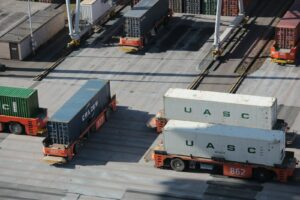The freight forwarder's position in the logistics chain gives rise to a specific liability regime. This system conditions the rights and obligations of the parties.
The commission agent's personal liability
The commission agent incurs personal liability in various situations related to his assignment.
Basis and principle of liability
Articles L. 132-4 and L. 132-5 of the French Commercial Code establish the commissionaire's personal liability. He is "guarantor" of the arrival of the goods within the time limit set, and of any damage or loss.
This liability is based on a presumption. The freight forwarder is bound by an obligation of result. He must ensure that the goods arrive in good condition and on time. Case law confirms this position, which is repeated in article 5.1 of the standard contract.
The principal is presumed to be liable as soon as any damage is ascertained. The principal does not have to prove fault. The mere existence of damage is sufficient.
This liability applies to damage occurring during the term of the contract, from collection to delivery.
The commission agent is personally liable in such cases:
- Failure to comply with instructions
- Unsuitable choice of transport
- Failure to provide advice
- Inability to track the shipment
- Failure to comply with documentary obligations
For a complete understanding of the legal status of commission agents, see our article on the legal status of the freight forwarder.
Grounds for exemption
Article L. 132-5 mentions force majeure as a reason for exoneration. The freight forwarder may also invoke any extraneous cause for which he is not responsible.
Recognised grounds for exoneration:
- Force majeureIt is characterised by irresistibility, unforeseeability and exteriority. Article 1218 of the Civil Code defines it as "an event beyond the debtor's control, unforeseeable and with unavoidable effects". Examples: unexpected strikes, wars, natural disasters.
- The act of a third partyThese include, in particular, fault on the part of the sender or the consignee. The freight forwarder is exonerated by proving that the damage resulted from defective packaging or incorrect instructions.
- Defects in the goodswhen the damage arises from the very nature of the product being transported.
The commission agent cannot exonerate himself by invoking the fault of his substitutes (carriers or intermediaries), for whom he is responsible under article L. 132-6.
Limitation of liability clauses
Unlike that of the carrier, the personal liability of the freight forwarder is not a matter of public policy. Article L. 132-5 authorises the freight forwarder to insert a "stipulation to the contrary in the consignment note".
This provision makes it possible to limit liability, or even waive it. Article 13.2 of the standard policy sets compensation ceilings:
- Loss and damage: €20 per kilogram of goods, not exceeding the gross weight in tonnes multiplied by €5,000.
- Delay: price of commission service
These ceilings do not apply in the event of wilful misconduct or inexcusable fault.
Many commission agents draw up their own general conditions with restrictive clauses. To be enforceable, these conditions must be known and accepted by the principal.
The commission agent's contractual obligations are detailed in our article on the freight forwarder's contractual obligations.
Substitute liability
The commission agent is also liable for the acts of his substitutes.
Principle and foundation
Article L. 132-6 stipulates that "the commission agent is liable for the acts of the intermediary commission agent to whom he sends the goods". This wording applies to all substitute carriers, warehousemen and handlers.
This vicarious liability is a French specificity with no exact equivalent abroad. It makes the freight forwarder the guarantor of the performance of the transport operation.
The basis of this liability has been the subject of various doctrinal analyses. Some see it as a form of del credere, others as surety. Case law recognises the originality of this system, which is specific to French law.
Extent of guarantee
The commission agent is liable for all damage caused by his substitutes, insofar as they are liable.
This guarantee applies if the commission agent has freely chosen his substitutes. He is not liable for intermediaries imposed by the principal or the authorities (article 5.6.2 of the standard contract).
Liability extends to direct substitutes (chosen by him) and indirect substitutes (chosen by an intermediary).
The freight forwarder is liable only for damage occurring during the term of the contract, from acceptance to delivery. The freight forwarder is not liable for earlier or later damage.
For a complete overview of the profession, consult our complete freight forwarder's guide.
Limits of the guarantee
The liability of the commission agent is subject to certain limits:
- Grounds for exoneration of substitutesthe freight forwarder may invoke the same grounds for exoneration as his substitutes. If the carrier proves force majeure, the act of a third party or inherent vice, the freight forwarder benefits from the same exoneration (except for personal fault).
- Legal or regulatory restrictionsLimitations: the freight forwarder may enforce against the principal the limitations granted to his substitutes by international conventions (CMR, Montreal Convention, Hague-Visby Rules) or by standard domestic transport contracts.
- Dismissals and statutes of limitationsThe commission agent may invoke the foreclosure or prescription acquired by his substitutes, in particular the absence of reservations on delivery or the expiry of the time limits for complaints.
These limits do not apply in the event of intentional or inexcusable fault on the part of the substitutes, which deprives them of the benefit of the limitations.
Our team of lawyers offers comprehensive expertise in this area, as detailed on our page transport law services.
The share plan
The liability regime is accompanied by specific procedural rules.
Action by the principal
The principal has a right of action against the commission agent under their contract. This action may relate to the commission agent's personal liability or his liability for the acts of his substitutes.
This right of action extends to the consignee, even if he is not the original principal, as long as he accepts delivery.
Article L. 132-8 gives the principal a direct right of action against substitutes, in particular carriers. This action is contractual, despite the absence of a direct contract.
The principal may bring these actions cumulatively and jointly and severally sue the commission agent and his substitutes.
This direct action is not permitted against all substitute carriers. It mainly concerns land carriers, but not necessarily sea or air carriers, whose agreements may reserve the right of action to the persons mentioned on the documents.
Actions on behalf of the commission agent
A freight forwarder who has indemnified his principal has a right of recourse against his substitutes who are liable.
This recourse may be a principal action or an action in warranty. The principal action is admissible only if the commission agent has indemnified the principal or has undertaken to do so. The action in warranty may be brought as soon as the commission agent is summoned.
The recourse action must comply with specific time limits:
- One month from the date of the summons for internal land transport (article L. 133-6)
- Three months for sea transport
- One year for international road transport (CMR)
- Two years for air transport (Montreal Convention)
There may be obstacles to recourse if the applicable law does not recognise the commission agent's right of action.
Recourse by the substitute against the principal
Article L. 132-8 gives the haulage contractor a direct right of action against the consignor and the consignee, who are the "guarantors" for payment of the carriage charge.
This action allows a carrier who has not been paid by the freight forwarder to take action against the original principal, even if the latter has already paid the defaulting freight forwarder.
The action shall be refused to the substitute carrier if the Principal had prohibited any substitution and the Haulage Contractor knew or should have known of this.
This action is specific to land transport and does not apply to sea or air transport.
Prescription and foreclosure
Actions relating to commission contracts are subject to special limitation rules.
Article L. 133-6, which applies to commission agents by reference, provides for a limitation period of one year. This period runs from delivery in the case of partial loss or damage, or from the scheduled delivery date in the case of total loss or delay.
The bar in article L. 133-3, which penalises the absence of reservations on delivery, does not apply directly to the freight forwarder in respect of his personal liability. It may, however, benefit him indirectly where the action against the carrier is extinguished by this bar.
Understanding the liability regime enables operators to better understand the risks associated with transport and to put in place appropriate strategies. It is an invaluable tool in resolving disputes.
Do you have a transport liability problem? Our firm is at your disposal to advise you and defend your interests.
Sources
- Commercial Code, articles L. 132-4 to L. 132-8, L. 133-3, L. 133-6
- Transport Code, articles L. 1432-7 to L. 1432-11
- Decree no. 2013-293 of 5 April 2013 approving the standard transport commission contract
- Civil Code, article 1218 (definition of force majeure)
- Court of Cassation case law on the liability of freight forwarders




